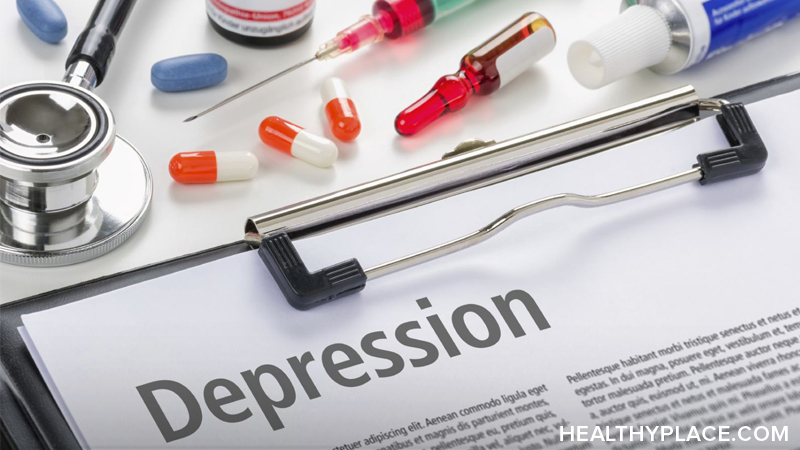Antidepressant Quiz

Take an antidepressant quiz and find out if you should consider taking an antidepressant medication for your depression.
Antidepressants are prescription medications used to treat depression and other psychological conditions such as anxiety, panic, obsessive compulsive disorder (OCD) and posttraumatic stress disorder (PTSD).
Antidepressant medications are often the first treatment choice for adults with moderate to severe depression, sometimes along with psychotherapy. Although antidepressants may not cure depression, they can help you achieve remission — the disappearance or nearly complete reduction of depression symptoms.
Take this antidepressant quiz and see if you might be a candidate for antidepressant medication. Answer true or false to the following statements/questions and then look at the corresponding additional information below:
- I am depressed.
True False - My symptoms of depression interfere with my daily living.
True False - I have been able to overcome symptoms of depression with other treatment.
True False - I would be willing to continue taking medications as prescribed for a period of at least several months.
True False - I'm willing to work through any side effects that the medications may cause.
True False - My symptoms are worse than any potential side effects of the medication.
True False - I am willing to try more than one medication if the first one doesn't work for me.
True False - I'm taking medications for other health conditions that will interfere with antidepressants.
True False - I will seek professional counseling to help with my depression.
True False - I will modify my lifestyle if needed to include exercising, reducing stress, and eating a balanced diet.
True False
Here is the key to the statements/questions above.
1. I am depressed.
Depression causes symptoms such as low energy, prolonged sadness or irritability, thoughts of death or suicide, and lack of interest in daily activities. It can be treated with antidepressant medication and psychotherapy.
2. My symptoms of depression interfere with my daily living.
Symptoms of depression can impact your relationships, ability to work or function at school. You may be sleeping too much or not enough or simply feeling tired all the time. Many with depression feel unworthy or guilty without obvious reason. They have problems concentrating, remembering or making decisions. And some think about death or suicide often. These symptoms are indications you may need an antidepressant.
3. I have been able to overcome symptoms of depression with other treatment.
If you have been able to control your symptoms through professional counseling, use of complementary therapy such as St. John's wort, or home treatment then you probably don't need an antidepressant at this time.
4. I would be willing to continue taking medications as prescribed for a period of at least several months.
Quitting an antidepressant medication too quickly can result in a relapse; a return of depression symptoms. Most doctors urge patients to remain on medication 7-15 months after recovery. Recurrent depression may require medication for the rest of your life.
5. I'm willing to work through any side effects that the medications may cause.
When you first start taking antidepressant medication, you may experience nausea, loss of appetite, diarrhea. Anxiety or irritability. Problems sleeping or drowsiness, loss of sexual desire or ability. Headaches or dizziness. For many, these side effects are mild and temporary and disappear within a few weeks. It's important to work through this period as your body adjusts to the medication.
6. My symptoms are worse than any potential side effects of the medication.
For some, one or more side effects may be permanent as long as you take the medication. When considering whether to continue the medication, it's important to balance the relief of depression symptoms against continuing side effects.
7. I am willing to try more than one medication if the first one doesn't work for me.
Unfortunately, scientists haven't yet discovered which antidepressants work best for a specific individual. Doctors accomplish that through trial and error. If you are not finding relief from a certain antidepressant or the side-effects are unbearable, tell your doctor. You might have to try a different one.
8. I'm taking medications for other health conditions that will or might interfere with antidepressants.
Bring a list of all the medications you are taking and share them with your doctor. Also, tell your doctor about any medical conditions you may have like high blood pressure, heart disease, headaches, pregnancy, seizures, diabetes or high salt levels in your blood.
9. I will seek professional counseling to help with my depression.
Psychotherapy offers people the opportunity to identify the factors that contribute to their depression and to deal effectively with them. According to the National Institute of Mental Health, a combination of therapy and antidepressant medication is the most effective treatment for major depression.
10. I will modify my lifestyle if needed to include exercising, reducing stress, and eating a balanced diet.
Not exercising, high stress levels and unhealthy eating habits all contribute to increasing the level of depression. Speak to your doctor about developing a healthy lifestyle.
Print out the results of this antidepressant quiz and share them with your doctor or other healthcare professional. Keep in mind, this antidepressant test is not to be used for diagnostic purposes. Only a doctor or qualified healthcare professional can diagnose depression or another healthcare condition and tell you whether or not you might need antidepressant medication.
APA Reference
Gluck, S.
(2022, January 4). Antidepressant Quiz, HealthyPlace. Retrieved
on 2026, January 21 from https://www.healthyplace.com/depression/antidepressants/antidepressant-quiz



